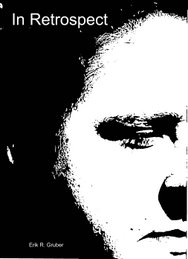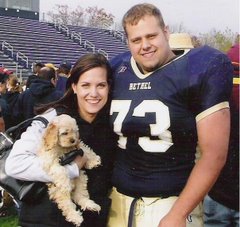 “The most potent weapon in the hands of the oppressor is the mind of the oppressed.”
“The most potent weapon in the hands of the oppressor is the mind of the oppressed.”Steven Biko (1946-1977) was a prominent anti-apartheid activist during what was arguably the climax of South Africa’s struggle for equality in the 1960s and early ‘70s. His efforts as a community organizer and leader are celebrated to this day and are recognized as a crucial element in the anti-apartheid movement. His controversial death brought the issue of racism in South Africa to the international arena.
Biko was born in King Williams Town, in the Eastern Cape Province of South Africa. While attending the University of Natal Medical School he became involved in the student activist organization National Union of South African Students. It didn’t take long for him to become disillusioned by this group, as it was run by white men (the very men oppressing him). He believed that Black, Indian, and other non-white students needed their own group to respond to apartheid. As a result, he founded the South African Students’ Organization (SASO) in 1968 and was elected its first president (this group evolved into the influential Black Consciousness Movement (BCM)).
Because of his work with this group, Biko was “banned” in 1973 at the height of apartheid. This meant he couldn’t leave the Eastern Cape, he wasn’t allowed to speak to more than one person at a time, he couldn’t make speeches in public, and it was forbidden to quote anything he said.
In spite of these restrictions, Biko returned to the Eastern Cape and established a community clinic, a trust fund for political prisoners and their families, and an education fund. Biko and the BCM also played a significant role in the Soweto Uprising of 1976 (a little history of the uprising: in 1974 the government passed the Afrikaans Medium Decree. The decree forced black schools to instruct in a 50-50 mix of English and Afrikaans, which is the indigenous language of South Africa. This was seen by many as a method of preventing blacks from furthering their causes through education and a tool of oppression. In 1976 students began protesting, organizing their efforts and refusing to go to school. This culminated with the Soweto Uprising, during which thousands of students organized for a peaceful protest. The uprising was crushed after heavily-armed police shot and killed 700 students). Following this incident, Biko became a primary target of authorities.
In August of 1977 Biko was arrested at a police roadblock under the Terrorism Act of 1968 (allowed the government to arrest anyone suspected of “endangering the maintenance of law and order” and hold them indefinitely without trial – sounds like Guantanamo…weird). He died three weeks later, still in police custody.
The circumstances of Biko’s death were a cause of great controversy amongst his supporters. The official story was that he died as the result of an extended hunger strike. Upon his autopsy, however, it was discovered that he had sustained massive injuries to the head, suggesting he had been beaten.
Thanks to journalist Helen Zille, news of Biko’s death and the reality of what happened to him spread quickly, revealing to the international community the brutality of the apartheid regime. His funeral was attended by several ambassadors and diplomats from the US and Western Europe. Journalist and personal friend Donald Woods authored numerous newspaper articles and a book about Biko’s life and death, for which Woods was eventually forced to flee South Africa.
The police officers responsible for Biko’s death were never brought to justice. At the time, the judge overseeing the case cited insufficient evidence and the lack of a witness as reasons for not charging the police forces.
Five former members of the South African Security Forces eventually admitted to the murder in 1997, but by then the time frame for prosecution had passed under South African law.
Steven Biko was a courageous man. He fought for what he knew to be right despite the legal, emotional and ultimately physical consequences he would inevitably suffer. His nonviolent approach to initiating change focused on the idea that his community needed to shift its mindset, needed to believe itself worthy of equality, and then equality would be won. Biko's efforts restored the pride in a long oppressed group of people and brought the world’s attention to the plight of South Africa.
Thanks for reading.


















5 comments:
Biko sounds like an interesting guy and a very sad story as well. I have never really heard of this man until now. These stories always make me made as well. You hear about things like this happening all the time and for some reason the people committing the murder always get away with it.
It sucks when things happen like that, he was a pretty young guy too.
On a side note, TMNT was the bomb and 50 cent sucks!
Reminds me of lots of the early Christian Martyr stories.
I would imagine it would take a lot of courage to stand up for what you believe and know is right when facing circumstances like he faced. I'm sure we all would like to believe we would do the same if ever place in a similar situation.
The thing that the persecutors don't realize is that his death probably had more of an impact than what he had during his life.
On a side note. Are you ready for some epic duels tonight Gruber? That's right, Werd Yelof, I know you're jealous.
It has taken many months for me to actually take a look at this "Zizzle-Zot" I have heard so much about... but I have done some catching up now!
I think I will become a new Zizzle-Zot groupie, if it is okay to call it that. Gruber, that definitely doesn't mean I am going to sleep with you or anything of that nature...
Just keep doing what you do...
Really makes you take a step back and realize that even when we feel like everything is going to shit; we really don't have it that bad. Our day to day problems don't really seem to even compare to the struggles that a person like Biko went through.
It takes a lot of courage to live a life like Biko and stand up for what you know is right even when you know the consequences will most likely end in death. You have to respect a guy like him for everything he has done.
Another great post from the Grub Daddy...I Like!
Side Note, it's good to see you Jake. I look forward to reading another perspective on the Zot
My iPhone cracked and I still have the warranty but I know they won't replace it unless the iPhone doesn't work because of the iPhone itself. It's 3g by the way. My mom got hers crashed and unable to wwork and got a new replacemnt one. I have no idea how it crashed. Too many apps? Or what?
________________
[url=http://unlockiphone22.com]unlock iphone[/url]
Post a Comment